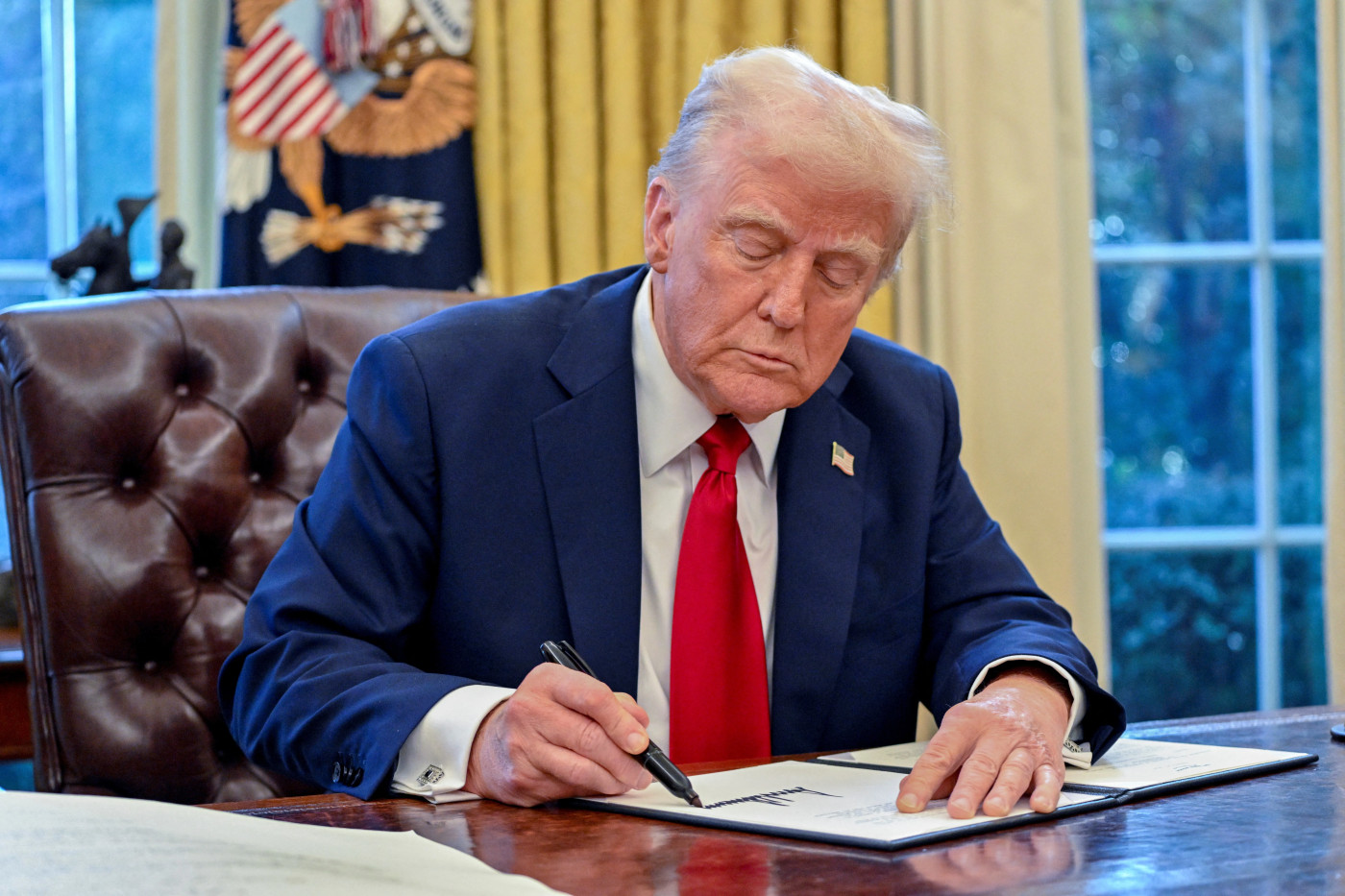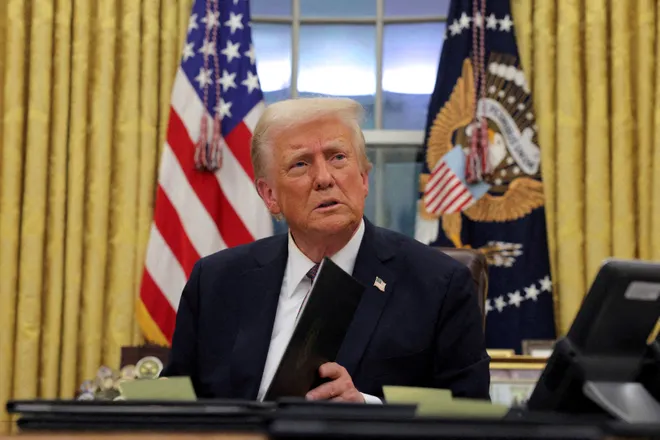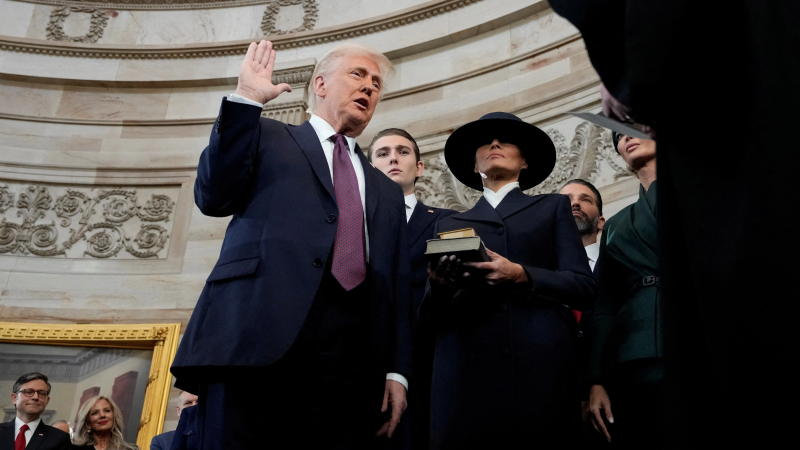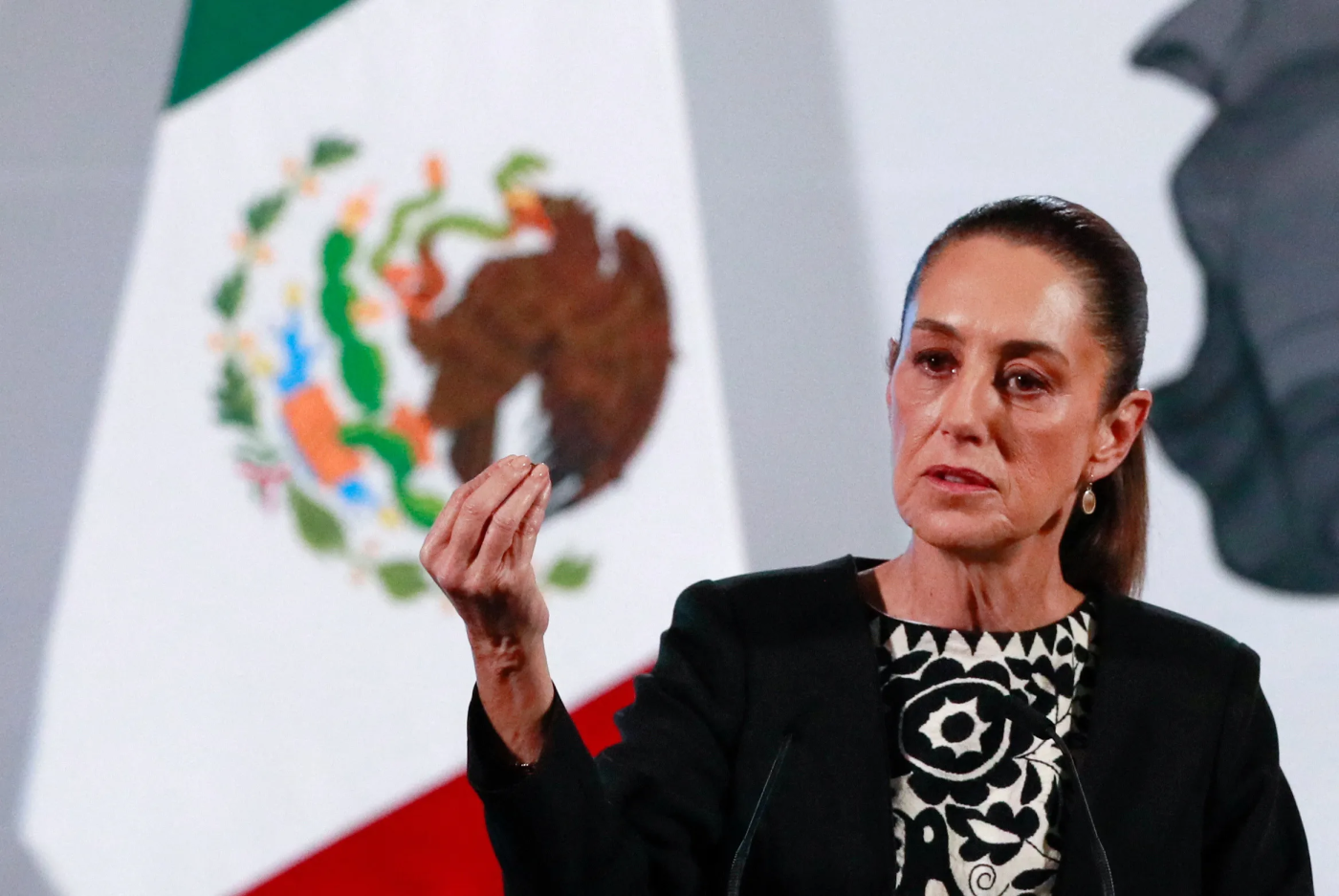
Trump imposes 25% tariffs on Canada and Mexico; China is hit with 10%
WASHINGTON —President Donald Trump signed a trio of executive orders on Saturday that imposed 25% tariffs on imports from Canada and Mexico and a 10% duty on imports from China as he sought to force the countries to clamp down on the flow of migrants and fentanyl across their borders and into the U.S.
An exception was made for Canadian energy, including natural gas and oil. Tariffs on energy imports from Canada were set at a lower rate of 10%, a White House official said, to minimize the potential for disruptions in gasoline and home heating prices.
The new tariffs on imports from all three nations are on top of existing duties. They are expected to go into effect on Tuesday.
Tariffs have been central to Trump’s economic strategy, and part of an attempt to increase tax revenue and protect jobs. He has also used them as a negotiating tool, threatening tariffs against countries as a way to achieve a myriad of policy concessions.
The leaders of Canada and Mexico said they would respond with retaliatory tariffs of their own.
Mexico's president Claudia Sheinbaum said she would be imposing retaliatory tariffs and lashed out at Trump’s suggestion that the Mexican government was collaborating with drug traffickers.
If the U.S. wanted to address the serious consumption of fentanyl they could “combat the sale of narcotics on the streets of their main cities, which they do not do” according to Google translation of her post on X.
“Problems are not resolved by imposing tariffs, but by talking and dialoguing,” she added.
Canadian Prime Minister Justin Trudeau responded to the U.S. trade action with 25% tariffs of its own against $155 billion worth of American goods.
That includes immediate tariffs on $30 billion worth of goods as of Tuesday, followed by further tariffs on $125 billion worth of American products in 21 days, he said.
Trump’s action will not only harm Canadians but will have “real consequences” for the American people, said Trudeau.“(It) will put your jobs at risk, potentially shutting down American auto assembly, plants and other manufacturing facilities,” he said. “They will raise costs for you, including food at the grocery store and gas at the pump.”
This move will also obstruct access to materials crucial for U.S. security, such as nickel uranium, steel and aluminum, he said.
“They will violate the free trade agreement that the president and I, along with our Mexican partner, negotiated and signed a few years ago,” he said.
The Chinese embassy in Washington did not immediately respond to a request for comment. But in response to a previous inquiry on the tariffs, embassy spokesperson Liu Pengyu said, "China will also firmly defend its own interests."
Trump also noted in his executive orders that if the targeted countries retaliate against the tariffs imposed, he "may increase or expand in scope the duties imposed under this Executive Order to ensure the efficacy of this action."

Decision time for Trump on tariffs:Will the U.S. president seek revenue or revenge?
Trump weighing a universal tariff
Trump is also debating a universal tariff and fees on the European Union but has not specified how much they would be and did not impose them on Saturday. He told reporters Friday that he was looking to hike tariffs on steel, aluminum, and eventually, copper. Tariffs on pharmaceuticals and computer chips are also on their way, he said.
He also vowed a blanket tariff on oil and gas imports by Feb. 18.
"We need to protect Americans, and it is my duty as President to ensure the safety of all," Trump said in a social media post on Saturday announcing the tariffs. "I made a promise on my Campaign to stop the flood of illegal aliens and drugs from pouring across our Borders, and Americans overwhelmingly voted in favor of it."
The U.S. Customs and Border Protection says it seized 27,023 pounds of fentanyl in fiscal year 2023, which was nearly double the 14,700 pounds of fentanyl the agency says it took into its possession in 2022.
Fentanyl overdoses caused an estimated 74,702 deaths in the U.S in 2023, according to the Centers for Disease Control and Prevention, down slightly from an estimated 76,226 deaths in 2022.
"The tariffs on imports from Canada, Mexico, and China send a powerful message that the United States will no longer stand by as other nations fail to halt the flow of illegal drugs and immigrants into our country," House Ways and Means Chairman Jason Smith, R-Mo., said a statement.
The chairman of the House's tax-writing committee said U.S. must "use all available tools including tariffs" to fight drug trafficking and fentanyl distribution.
Canada and Mexico are the top sources of U.S. crude imports, together accounting for around one-quarter of the oil U.S. refiners process into fuels such as gasoline and heating oil, according to the U.S. Department of Energy.
In 2022, Canada accounted for 60% of crude oil imports to the U.S., while 10% of crude oil came from Mexico, according to the U.S. Energy Information Administration.
Refineries purchase crude oil to produce gasoline, diesel fuel, and other petroleum products.

Economists have long warned that tariffs – duties on imports— will boost inflation and hurt consumers. Trump and his advisers have dismissed those concerns, pointing to data that shows inflation was low in his first term, even after he put duties on certain nations and products.
"Tariffs don't cause inflation. They cause success," Trump said on Friday. "There could be some temporary short-term disruption, and people will understand that."
Democrats accused him of waging a trade war in statements responding to his tariffs on Saturday, in which they took issue with Trump imposing a higher rate of duties on U.S. allies Mexico and Canada than he did on competitor nation China.
"While China is stealing our technology and actively undermining American industry, Trump is cracking down more than twice as hard on maple syrup and avocados from Canada and Mexico. How does that make sense?" Sen. Elizabeth Warren, D-Mass., said in a post on X.
Republican Sen. Rand Paul also raised concerns about the potential inflationary effect of the tariffs on the social media platform. "Tariffs are simply taxes. Conservatives once united against new taxes. Taxing trade will mean less trade and higher prices."
"We won the last election by complaining about Democrats' policies, which gave us high prices. Tariff lovers will be forced to explain the persistence of high prices," Paul, a libertarian from Kentucky, said.
Trump relies on national emergency authority to impose tariffs
The White House said Saturday that Trump was utilizing the International Emergency Economic Powers Act, or IEEPA, to impose tariffs on China, Mexico and Canada.
IEEPA gives the president authority to deal with any "unusual and extraordinary threat, which has its source in whole or substantial part outside the United States, to the national security, foreign policy, or economy of the United States, if the President declares a national emergency with respect to such threat."
Trump said his administration determined that the "sustained influx of illicit opioids and other drugs" was enough to trigger the authority, which the White House said would not be lifted until it determined that the crisis had been alleviated.
In a statement, Reps. Suzan DelBene of Washington and Don Beyer of Virginia, two Democratic lawmakers who have introduced legislation seeking to restrict Trump's ability to unilaterally levy tariffs, accused him of a "blatant abuse of executive power."
"Congress must reassert its authority by reining in this egregious misuse of the law," the lawmakers said.
The tariffs could prompt legal action, with parties arguing that Trump is not using the authority the way Congress intended, said William Reinsch, a senior adviser with the economics program at the Center for Strategic and International Studies (CSIS) and a former under secretary of commerce for export administration.
But he said, "The reality is, the bar for what constitutes the emergency has gotten pretty low over the years, so I think he gets away with it."

In the first of the orders to be published, Trump officially threatened to expand tariffs against Canada, if the country sought to retaliate.
"Should Canada retaliate against the United States in response to this action through import duties on United States exports to Canada or similar measures, the President may increase or expand in scope the duties imposed under this order to ensure the efficacy of this action," the order said.
This story has been updated to add new information.
Swapna Venugopal Ramaswamy and Francesca Chambers are White House Correspondents for USA TODAY. You can follow them on X @SwapnaVenugopal and @fran_chambers.

